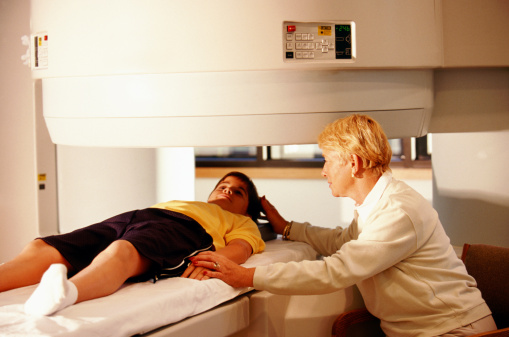

Nuclear medicine is a highly specialized field of radiology. It requires the oral or intravenous administration of radiopharmaceuticals, radioactive isotopes combined with organ specific medications, in order to perform a diagnostic exam. In order to diagnose a patient, nuclear medicine focuses on how well body parts are functioning – as opposed to other fields of radiology which focus on what organs look like. The beauty of becoming a nuclear medicine technologist is that you have the ability to work with every system of the human body – skeletal, circulatory, endocrine and pulmonary – and regularly save lives by accurately diagnosing a patient’s illness.
As a nuclear medicine technologist you will be required to orally and intravenously administer radiopharmaceuticals in order to perform diagnostic testing. Nuclear medicine technologists have the opportunity to work in various settings from hospitals, outpatient clinics, research/academic facilities or traveling to different facilities.
Hospitals: Working in a hospital setting is perhaps the best way to begin your career as a nuclear medicine technologist because you will be exposed to every study in the field such as cardiac stress testing, lunch ventilation/perfusion imaging, radioactive thyroid uptake and scan and whole body scans to name but a few. Working in a hospital is an excellent opportunity to become a well rounded nuclear medicine technologist. However, such broad based experience does not come stress-free. Working in a hospital often requires you to perform emergency procedures – conditions such as blood clots and gastrointestinal bleeding can be fatal if not diagnosed and treated immediately, so you may well find yourself in the hospital in the middle of the night and on weekends in order to save patient lives. After working in a hospital setting for a few years you will have the knowledge, skills and abilities to market your skill set to other settings.
Outpatient centers: There is a lot of variety in outpatient centers. Some may offer a broad scope of studies, rather similar to a hospital, while others may focus on specific organs such as the heart. Outpatient centers typically offer a set work schedule and as there is no emergency room your evenings, weekends and holidays normally belong to you. While there are many benefits to working in an outpatient center, you may want to exercise caution in starting your career here as, if you start your career in a cardiology office, you may not gain experience with other studies such as bone scans and lung scans which could limit your marketability in looking for subsequent roles.
Academic/research facilities: In these facilities you normally focus on one aspect of nuclear medicine such as, for example, cancer studies. Work in these facilities normally has the benefit of a set work schedule, but can face the same limitation of an outpatient facility, i.e. the lack of exposure to broader nuclear medicine studies outside of your specific field of research.
In addition to obtaining the skills and abilities required to pass nuclear medicine exams, there are certain skills that are required that schools cannot teach you. Along with skill and ability, you must develop high levels of patience, understanding and compassion. Nuclear medicine exams are lengthy, often lasting over an hour. In addition, nuclear medicine patients are often more ill and uncomfortable than patients seen in other areas of medicine. Many patients have cancer, bone infections, heart conditions and other health issues that may make it difficult for them to lie on an imaging table for 60 minutes while the exam is completed. Your job as a nuclear medicine technologist is to recognize the condition of the patient, make them as comfortable as possible and perform the best exam you possibly can to ensure a proper diagnosis. Many patients simply don’t feel well and don’t know why – it is your job to find out.
There are many benefits to becoming a nuclear medicine technologist but, as with any career – but you also need to have your eyes open to the more challenging aspects of this career too. We help you weigh up the pros and cons.
To become a nuclear medicine technologist you must complete a minimum of an associate degree program in nuclear medicine technology. However, in today’s work environment most employers favor candidates that have completed a four year baccalaureate program in nuclear medicine technology.
In 2010, the median annual wage for nuclear medicine technologists was $68,560. Those in the lowest 10 percent earned under $49,130. Those in the top 10% earned more than $91,970.*
Compensation for nuclear medicine technologists varies according to your location, based on local supply and demand. For example, there are many nuclear medicine programs in Pennsylvania – and hence many nuclear medicine technologists – hence the starting compensation in PA is around $18-20 per hour. Conversely, in states such as Montana and Wyoming where there is high demand but not much supply the starting compensation for a nuclear medicine technologist can be in the $24-28 per hour range.
The main difference between Nuclear Medicine and other imaging related fields such as X-ray, CT and MRI is that you deal with the function of the organ of interest instead of the anatomy of the organ of interest. This is why nuclear medicine exams are often done is conjunction with CT or X-ray to perform a diagnosis. For example, a CT scan may show a gallstone, but a nuclear medicine scan will show if the gallbladder is functioning properly in the presence of a gallstone. A physician may not remove the gallbladder just because of the presence of a gallstone but may remove it if the gallbladder is not working properly. Many times, surgical decisions will be made primarily on the basis of a nuclear medicine exam. This is what makes nuclear medicine a great field – you are truly a part of the decision making process for the overall care of the patients that you treat.


Per diem opportunities: With the changes in insurance reimbursement over the past decade, many cardiologists and radiologists now opt to perform nuclear medicine procedures in their private offices and clinics. Since they often do not have the need for a full time nuclear medicine technologist, medical staffing companies provide nuclear medicine technologists to private practices on an as-needed basis. Working on a per diem basis affords a large amount of variety – one day you could be working in a cardiologists office, the next in a radiology practice and the next in a sports medicine clinic.
Travel opportunities: Nuclear medicine technologist travel jobs are growing fast. When working on travel assignments, you will be matched with facilities around the country that are short of people with your skills. You have the opportunity to travel to different parts of the country on 13 or 26 week assignments, meet new people, learn new skills, discover America and choose your shifts. Get started today.
By Bob Shifko
Robert Shifko received his Bachelor of Science degree in Nuclear Medicine from Edinboro University of Pennsylvania. He continued his education receiving graduate level certification in Epidemiology and Biostatistics from Drexel University Graduate School of Public Health. With 18 years experience in a health care setting he has certifications in Nuclear Medicine, Epidemiology, Biostatistics and Radiation Health Physics. He currently performs research for the University of Pittsburgh Department of Pharmacology and assists in the creation of standardized tests for medical professionals.
Salary source: *Bureau of Labor Statistics